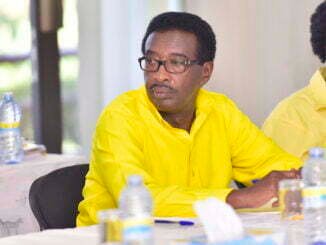
Kampala, Uganda | URN | The Deputy Speaker of Parliament, Thomas Tayebwa, has directed the Minister of Education and Sports to present a statement on the issue of expired programs in different universities. He issued the directive during the plenary sitting on Tuesday 23, May 2023 in response to concerns about universities offering courses that are considered expired.
“The media is awash with stories on universities teaching what is being termed as expired courses. There is a very big scare, I have received very many messages from student leaders in the country, parents, and honorable colleagues on this issue,” said Tayebwa in part.
He also highlighted the rejection of a graduate program application by the University of Bristol due to an expired undergraduate degree from Makerere University, which further underscored the urgency of addressing the issue.
“I have taken time off to consult a few stakeholders from National Council for Higher Education (NCHE), Ministry, and Universities and it is an issue that needs to be given serious attention. We want to get a real picture of what is happening and it is very critical for the Minister of Education…tomorrow to bring a statement on this issue updating the country about the situation,” the Deputy Speaker said.
The Chief Opposition Whip, John Baptist Nambeshe, expressed his concern about the negative perception caused by foreign universities rejecting Ugandan degrees.
“The culprits are known…the statutory regulator of this sector is the National Council for Higher Education and it has been sleeping on the job. Courses that are not duly accredited for teaching, they should be able to know and even the university management systems have failed. So these two, are the culprits,” said Nambeshe.
Dr. Abed Bwanika, the Kimaanya-Kabonera Division MP, raised an additional concern regarding the registration of veterinary doctors who graduate from Makerere University. “The Uganda Veterinary Board wrote a letter that they are no longer going to register veterinary doctors qualifying from Makerere University. And this has affected service delivery and those who are qualifying. I want to request that the Minister’s statement include the veterinary doctors that are not being registered,” he said.
Paul Akamba, the Busiki County MP, brought attention to the predicament faced by individuals holding degrees in courses such as Bachelor of Arts in International Business, which are not recognized by the public service.
“Ugandans spent a lot of money to educate their children but they have never had an opportunity of getting a job because Public Service does not recognize such a course. How do we help such Ugandans, that are holding such papers and not recognized?,” he asked.
Akamba appealed to the Deputy Speaker to direct the Minister of Public Service to provide a statement on this matter. In response to these requests, Tayebwa clarified that the Committee on Education and Sports would be the appropriate body to address these concerns. He also clarified that the Ministry of Public Service does not have the authority to accredit courses in the country, making it improper to request a statement from the line Minister.
Read Also: Religious leaders in Uganda decry commercialization of education
Available information indicates that the National Council for Higher Education requires regular re-assessment and review of programs every five years for masters, bachelors, and diplomas, and every ten years for PhDs.
“Expiry of accreditation means that the program needs re-assessment to establish whether the key aspects upon which accreditation was granted are still in place,” the statement posted on NCHE’s website on May 22 reads in part.
The re-assessment process evaluates various factors, including the program’s relevance to the market and the nation, compliance with minimum standards, the quality of graduates, and adherence to the program’s design and content. It is important to note that this re-accreditation procedure adheres to both national and internationally accepted standards.



